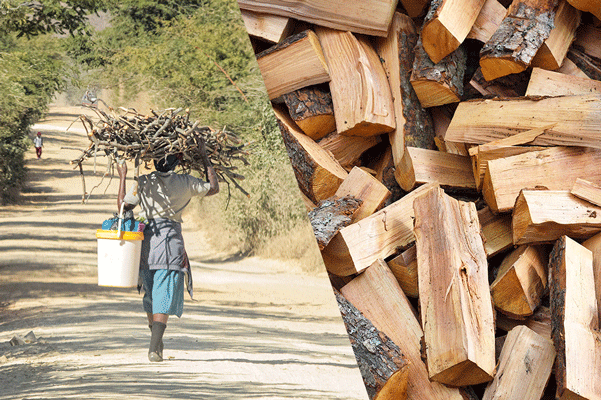
By Lizwe Sebatha
PLUMTREE — Not a single day did Mthabisi Moyo ever imagine making a living from firewood trading, at least he says.
For years, Moyo made a living smuggling fuel and other basics from Botswana at the Plumtree border post for sale in the border town.
“All I needed was to know the gatekeepers at a given day at the border to allow for safe passage of the smuggled goods,” the 35-year-old father of two says.
However, Covid-19 struck, forcing the government to close borders to minimise spread of the disease in the country and that cut off Moyo’s lifeline.
Again, breaking the law, Moyo now sells firewood to eke out a living.
Moyo and his colleagues often wake up as early as 4 am to go into the forest and farms such as Matole and Solwezi village on the outskirts of Plumtree to cut firewood.
The traders brave arrest and many dangers such as wild animals.
- Chamisa under fire over US$120K donation
- Mavhunga puts DeMbare into Chibuku quarterfinals
- Pension funds bet on Cabora Bassa oilfields
- Councils defy govt fire tender directive
Keep Reading
A small bunch consisting of four small pieces of wood costs $40 and above.
Former fuel smugglers in Plumtree whose source of income has been disrupted by Covid-19 are resorting to fetching firewood for sale.
In the process, they disrupt the environment. There are fears that if this continues, mopane worms will become scarce.
They cut down several trees, including mopane, whose leaves are a primary source of livelihood for mopane worms/caterpillars.
Studies show that although mopane branches take longer to dry, they burn slowly and produce a high constant heat, making it preferable particularly during winter.
In Bulawayo, residents prefer indigenous energy tree species to exotic ones with mopane being the most popular.
The caterpillars that feed on mopane are not only considered a delicacy and an important source of nutrition but a source of income for many in rural Matabeleland and elsewhere in southern African countries such as Botswana and Namibia.
Under the Forest Act, illegal firewood poachers face a level three fine of $500.
Norman Mpofu, a former legislator for Bulilima East, lamented the firewood poaching, which he blamed on lax enforcement by the police to curtail deforestation. “Police authorities in Bulilima and Mangwe need to act and protect the environment,” Mpofu said.
He worries that this will result in villagers in the district not harvesting mopane worms owing to deforestation.
“Big mopane trees have been cleared within a short space of time as these poachers use chainsaws,” Mpofu said.
Fortunes Matutu, a forester recently writing for the Zimbabwe Youth Biodiversity Network said 2020 has seen many mopane worms dying due to lack of leaves. He said this could be attributed to deforestation and climate change.
For people like Moyo, unauthorised firewood trading is about their livelihoods and not the environment.
The high cost of electricity has ensured there is a ready market not only in the border town but in places as far as Bulawayo as many people have turned to firewood for energy.
Matabeleland South police spokesperson Inspector Philisani Ndebele did not have ready statistics of firewood poachers arrested by the police since the start of the Covid-19 lockdown period in the country.
“However, it is our duty as the police to enforce the law and arrest the offenders,” Ndebele said.
Mpofu, however, insisted that police have been a big let-down in the fight against firewood poaching by former fuel smugglers and others in the district.
Locals are also ignorant of the damage they are causing.
“Unfortunately, locals and farmers don’t seem to realise the negative impact of such activities. Desertification will soon hit these areas if nothing is done,” Mpofu argued.
In May, national tree ambassador Never Bonde petitioned the government to take a tough stand against illegal firewood poaching.
Bonde has planted thousands of trees in public institutions countrywide.
To sell firewood, one needs to be registered with the Forestry Commission but most firewood traders do not follow this procedure.
The Bulawayo Vendors and Traders Association (BVTA) says millions of Zimbabweans have been plunged into abject poverty and debilitating hunger due to the current lockdown restrictions.
“The Covid-19 restrictions have completely destroyed the livelihoods of the majority of informal traders and vendors.
“Given the fact that informal trading is their sole source of income, it means no money for food, rentals and other important things,” said Michael Ndiweni, the associations’ coordinator.
“At the end of the day, one has to make a living,” Moyo says.
The Community Youth Development Trust (CYDT) agreed that this was an issue of livelihoods disrupted by the pandemic.
“Cross border trading provided a source of living for many youths in the region and beyond, but with the closure of ports of entry a number of people have turned to other means, legal or illegal to make ends meet,” said Bongiwe Ncube the information officer at CYDT.
In a statement, the Zimbabwe Chamber of Informal Economy Associations recently called on the government to stop criminalisation and stigmatisation of informal workers and traders, they instead requested an increase in efforts to accelerate empowerment initiatives for SMEs.
l This article was originally published by The Citizen Bulletin, a hyper local news outlet covering Covid-19 in Matabeleland.










